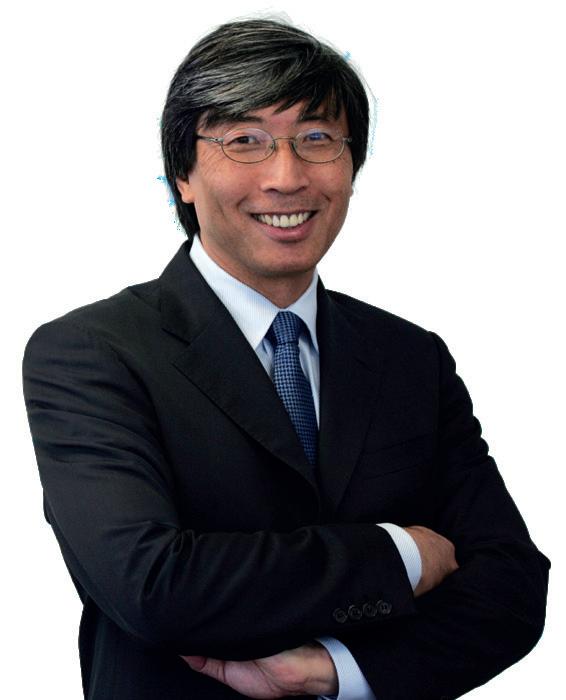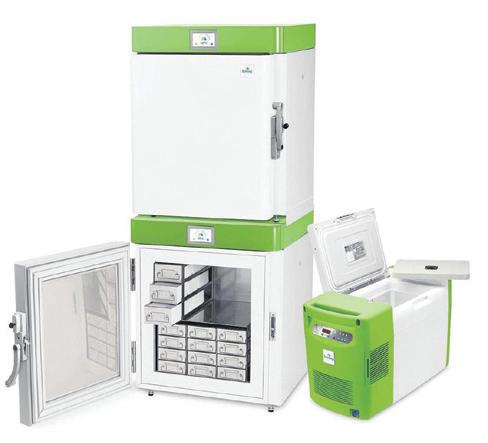
7 minute read
FEATURE: COVID CHALLENGE
BY UFRIEDA HO
THREE WITSIES IN THE UNITED STATES ARE PLAYING THEIR PART IN VACCINE RESEARCH AND SUPPORTING HIGH-DEMAND LOGISTICS. THEY ARE SURGEON, BUSINESSMAN AND BIO-SCIENTIST PATRICK SOON-SHIONG (MBBCH 1975), ENGINEER DAVID BERCHOWITZ (BSC ENG 1975, MSC ENG 1978, PHD 1986) AND ENGINEER AND STRATEGY INNOVATOR NEILL LANE (BSC ENG 1982).

PATRICK SOON-SHIONG
Back in the mid-1970s when Patrick Soon-Shiong was a recently graduated medical doctor he spent some time working in clinics in the Eastern Cape. It would deliver one of his a-ha moments.
By then he had completed his internship, breaking barriers by becoming the first doctor of colour working at the then Johannesburg General Hospital. But he turned down an offer of a permanent position there and took up work at TB clinics in the Eastern Cape instead.
“I realised then that there wasn’t any technology that I had in my hands except a streptomycin injection, not even an X-ray. I was either hurting these children or not helping them and that’s when I said to myself I will go away and come back and bring technology to South Africa. I thought it was going to take me five years – I miscalculated,” Soon-Shiong said, with an ironic laugh.
He was speaking during an in-conversation webinar with Professor Shabir Madhi, Dean of the Faculty of Health Sciences, held on 5 March 2021.
Soon-Shiong has lived abroad since the late 1970s and has been based in Los Angeles since the late 1980s.
One of his companies, ImmunityBio, is in the clinical trial phase of its COVID-19 vaccine candidate known as hAd5-Covid-19.
Since receiving US Food and Drug Administration approval and the green light from the South Africa Health Products Regulatory Authority, trials have also been underway in South Africa at the Wellcome Centre for Infectious Diseases Research in Africa’s Khayelitsha site. These trials have been overseen by researchers from the University of Cape Town. Also in trial is an oral (pill form) booster vaccine. A vaccine in pill form will obviate the need for a healthcare professional to administer an injection and will be more stable and easier to transport and distribute.
In the company’s press release Soon-Shiong said: “We believe that the key to creating long-term immunity to the SARS-CoV-2 virus and overcoming the variants that are rapidly developing around the world is to create a vaccine that activates not only antibodies but also memory B and T cells to multiple antigens. Furthermore, room-temperature stable formulations for oral delivery have the potential to solve the cold-chain challenges of distribution and the ability to generate mucosal IgA antibody barriers to the virus in the upper respiratory tract where it first enters the body.”
Soon-Shiong’s message for South Africa to be able to better navigate the vaccine landscape is for leadership at all levels — from government through to academia and the private sector — to focus on building sustainable capacity. He said: “South Africa needs to be generating capacity, generating material so it is self-sufficient and can control the supply chain.”
During the webinar, Soon-Shiong paid tribute to “the giants on whose shoulders we stand”, mentioning some of the professors he trained under (Daniel du Plessis, Bert Myburgh, Harry Seftel, Michael Boswell, and John Barlow) and also praised the leading role Wits researchers are playing in the science on COVID.
The Gqeberha (formally Port Elizabeth)-born Soon-Shiong is part owner of the LA Lakers and remains a keen basketball fan. He signed off the webinar inviting his former Wits classmates to a friendly match when he expects to visit South Africa in the future.
WHERE DO WE WANT TO GO FROM HERE?
“I believe this is the future, not just for COVID, but for influenza, TB, leprosy, Lassa fever, chikungunya. This the opportunity for us to take this technology and expand it for countries that really need this kind of vaccinology,” Soon-Shiong said during the webinar. “I think this is what the WHO calls constructive disruption.” On 18 March 2021 local pharmaceutical company Biovac announced a partnership with ImmunityBio. “The technology transfer with ImmunityBio will build Biovac’s capability for active pharmaceutical ingredient manufacturing,” the companies said in a statement. Working together will help build “a solid foundation for an independent local response to future pandemics.”
NEILL LANE
For Neill Lane, who is chief strategy officer at Stirling Ultracold, the COVID-19 pandemic has meant his company has had to adapt its technology and product offerings to meet new demands from customers with needs specific to their part of the world.
It’s seen the company merge its technology into a range of products to accommodate more specifications. There are large-sized units for commercial-scale storage facilities and units designed to fit under counters, suitable for small, remote clinics. The coolers are made up of stacked trays and designed to accommodate the storage and safe transportation of the glass vials the vaccines come in.
Lane is a qualified mechanical engineer but has been pivotal in steering his company’s strategy to promote adoption of new energy products. He’s also been instrumental in developing the market for his company’s products for commercial, scientific and aerospace applications.
Lane was born in Zimbabwe and came to South Africa as a student. At Wits, like his colleague David Berchowitz, he studied under Professor Costa Rallis, who was his graduate advisor and later someone he would come to call friend.
“I had intended to finish my PhD remotely. Of course, that never happened when I left the country in 1988,” he told WITSReview.
He said: “Growing up in Zimbabwe and subsequently visiting southern Africa many times, I am acutely aware of the global disparities in how we respond to the pandemic. Our small, portable freezers are well suited for resource-poor areas, and a number of international aid organisations are evaluating them to help in vaccine transportation and storage.”
Being a student in the 1980s was also an education beyond the lecture halls. “Wits was foundational to my career in technology, later in entrepreneurship, and my belief in the importance of job creation. Being in South Africa and on the Wits campus in the 1980s also taught me so much about inequality, racism and the need for social justice.”

DAVID BERCHOWITZ
One of the biggest logistical dilemmas in the rush to get vaccines to as many people as possible, as quickly as possible, has been to find solutions to safely transport and store vaccines at ultra-cold temperatures.
In the case of the Pfizer-BioNTech vaccine “ultra-cold” means temperatures of -70 degrees Celsius. The Pfizer-BioNTech vaccine is expected to be among South Africa’s choice of vaccines in the future.
The man behind refining the technology that has made refrigeration at these temperatures possible is David Berchowitz. He is chief technology officer of Stirling Ultracold, a company based in Ohio in the United States.
The technology for their ultra-low temperature fridges is based on using cycles of expanding and compressing gases to create the heat energy that powers the fridges’ engines.
Berchowitz told WITSReview: “Our freezers use very little power and operate without difficulty over a wide range of voltages and frequencies. This makes them ideal for any situations where power is at a premium and/or unstable, which often go together.” Berchowitz said COVID-19 meant shifting gears. “I had not anticipated deep temperature vaccine storage until the pandemic, though I fully understood that some refrigeration was needed for the so-called ‘cold-chain’ to bring medicines and vaccines to point-of-use.”
He also noted: “The very first commercial unit using our technology was a portable cooler developed by Twinbird, our licensee, in about 2004. In fact, I had two units shipped to Wits Mechanical Engineering as examples of this unique technology.”
Berchowitz calls the US home now but visits SA occasionally. His sister still lives in the house he grew up in in Potchefstroom. He said of his Wits student days: “I loved being at Wits; I had the enormous good fortune to have Prof Costa Rallis (BSc Eng 1947, MSc Eng 1948, PhD 1963, DSc honoris causa 2003) be my advisor. He was a giant among those who have influenced my way of thinking. Of course, it was during the apartheid years, so things were never without immediate moral implications which often flavoured our discussions.”
WHO WERE THE FOUNDING FATHERS?
Robert Stirling was awarded a patent for the first Stirling engine in 1816. His invention was first used as a cooling tool in 1834 by astronomer John Herschel and in 1876 John Gorrie was recognised as the first person to use the engine to produce ice. These three men are considered by Stirling Ultracold to be the founding fathers of the Stirling engine. They charted the way that has led the company to produce the industry’s most energy-efficient ultra-low freezer.











